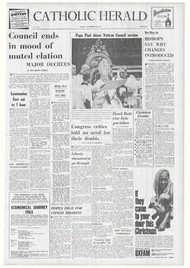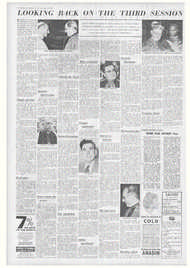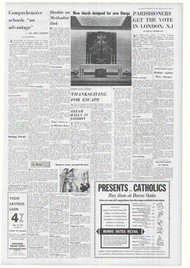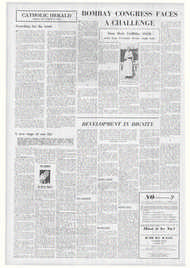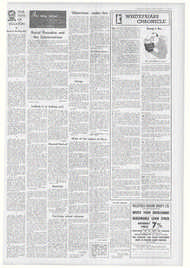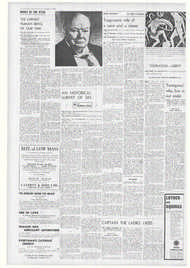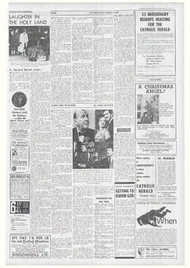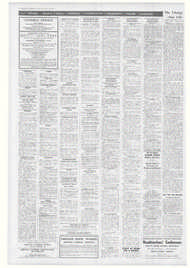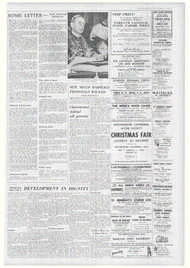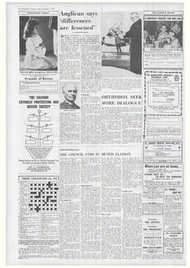Page 6, 27th November 1964
Page 6
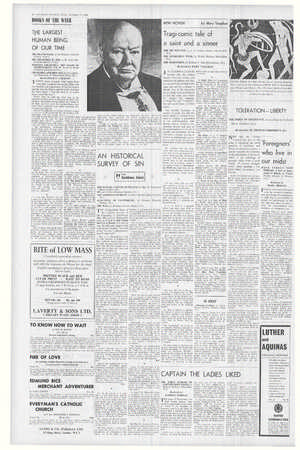
Report an error
Noticed an error on this page?If you've noticed an error in this article please click here to report it.
Tags
Share
Related articles
Legend And Lyric Make A Feast Six Books On Irela Nd...
The Flesh Is Weak
Novel By Archbishop Mathew
The Many Mansions Of The Novel
Books For The Children
Tragi-comic tale of
a saint and a sinner
THE SIX WOUNDS, by J. A. Cuddon (Barrie and Rockliff. o 21s.).
THE SCORCHING WIND, by Walter Macken (Macmillan, 25s.).
THE MARTI RED, by Richard E. Kim (Hutchinson. 18s.).
Reviewed by MARY VAUGHAN JA. CUDDON is a Catholic novelist who has written several first-class books and continues the pattern with this. his second book published this year, and set for a change in Brazil. Two of his characters have a fairly close resemblance to real life saint and sinner: Fr. Angelo, the stigmatic, to Padre Pio, and "Vaasgord", the self-styled Dane, to Eich
mann.
The horrible battening on sanctity of greed, vice and vulgarity which so sickened Huysmans at Lourdes is personified in the half-Portuguese, halfSicilian Mafiosi, Vespucci, who enmeshes himself and most of the local population in his net of cupidity and corruption. All the inhabitants, whether residing in brothel or archepiscopal palace, have a stake in the survival and exploitation of the pain-wracked
priest.
Mr. Cuddon tells his tragicomic tale with starry-eyed cynicism and the wit and warmth of a writer whole-heartcdly involved in his story. Will he please betake himself peat to the present-day
Dublin. Or to Galway, which is the setting of much of The Scorching Wind—the final blast of the gale that blew through Ireland ever since Strongbow's cursed visitation.
Just one small nark—the constant hinting at things to come. "He was to think of this later ..." "He was due to do so and he would hardly like it ..." "He was to get the opportunity . ." No such incentives to continue are needed, as this is a gripping and beautiful book.
It is the third of a splendid trilogy, and goes from 1916 to the post-treaty Civil War in which one of two brothers is killed — perhaps by the other who, having been slow to kindle, has burned the more fiercely in the cause of freedom, so scorchingly even that he has felt that Civil War was not too high a price to pay for the possibility. alas, not yet realised, of an undivided Ireland.
Much of the story is told with a wry gallows humour and all of it with pity and poetry and an impartiality almost unnatural in an Irishman writing of those desperate seven years. Here you will find a blazing account of the differences between Free Staters and Sinn Feiners in the final bitter dialogue between the two brothers.
You can understand the "plague on both your houses" attitude of many patriotic Irishmen after listening to the doctor who does more than his minimal medical duty to the wounded. You will understand the savage necessity for the burning of so many Big— and beautiful — Houses. and appreciate the weary courage and kindness of "the ordinary people" who stood solid behind the fighting few. A great book.
Civil war—this time in Korea— is also the background to The Martyred. a book by and about a young officer in the Korean war, Godless but not anti-God, sharing the desperate pity of friends and fellow-officers for the wretchedness and misery of his suffering people.
Mr. Kim is himself an admirer of Camus, to whom he dedicates this book, already a best-seller in America, where he now lectures. Like Camus, he poses more questions than he knows how to answer.
The "martyrdom" of 12 out of 14 captured Christian ministers is as problematical as their motives, as the value of Christianity, of prayer and of suffering, of the necessity for exposing and even flaunting a truth that might be better suppressed, of the nihilism of despair.
The story-thread is slight but the book is hauntingly memorable and thought-provoking. It even provokes one irreverent thought— would all the armies of the world grind to a peaceful, if neurotic, halt if their tea supplies were cut off? The Koreans seem to have brewed-up as non-stop as the
British army or any other all-male institution.
A Single Man, by Christopher Isherwood (Methuen. 18s.) would be less nauseous if the homosexuality of the middle-aged English lecturer (America seems to be fairly pullulating with such) of the title were less taken for granted as part of a completely normal pattern—and "normality" not so obviously regarded as something slightly devious. A wellwritten and horrible little book.
Some of the points on which Strange Way Home, by Nancy Faber (Michael Joseph, 21s.) hinges arc so psychologically unlikely that they undermine the credibility of the whole story, although it is actually founded on fact—the kidnapping of a Jewish boy in New York by his fanatical tutor who takes him to a poor Quebec village and brings him tip ahsooka C. atholic. Despite these irritating inconsistencies, a very readable The Other, by C. F. Keppler (Victor Gollancz, 25s.) is an extraordinary story of a doctor's struggle with insanity in others and, finally, in himself. This would be a very remarkable book for a seasoned author and is a major tour de force for a first novel.
Antonio Barolini's A Long Madnes1 (Victor Gollanu, 25s.) is a distinguished novel which covers 30 years of intricate, passionate Italian family life and religion, real and bogus.
Gillian Avery's The Italian Spring (Collins, 13s. 6d.) sees late nineteenth century Italy, and Florence in particular, through the eyes of a happily transplanted English girl and is excellent light reading for children and adults.
In Winds of the Day, Howard Spring succeeds in the difficult task of making credible the lirst-person telling of the story of a servant girl, orphaned early in the century who looks hack, mainly with placid satisfaction, on her life as the wife of two literary men (not simultaneously). (Collins, 21s.)„ Jane Lane in A State of Mind (F. Muller. 20s.) steps forward from the past which she has so vividly recorded in her historical novels and moves into a Statecontrolled, religion-free (if that's the right word!) future, where she makes from unconquerable human minds and unsuppressible human jeomgotsitoonrys. a moving and outstand Another highly competent historian is Catherine Gavin who. in The Fortress (Hodder and Stoughton, 25s.) has woven a compelling love story into an historical tapestry of the nineteenth century mainly concerned with a very little known side of the Crimean War— the Royal Navy's Baltic battles with the Russian fleet.
Much less convincing history is Dennis Wheatley's They Used Dark Forces (Hutchinson, 21s.), an account of the poisonous flowering and fading of the Nazi party. mixed with satanism, black Masses. incest, hypnotism and kindred ingredients and pepped up with recurring bedroom scenes. To Mr. Wheatley's Gregory Sallust I prefer Bond—who I heartily dislike.
I'm sorry to have left so little room to refer to Stanley Middleton's Him They Compelled (Hutchinson, 21s.), boldly announced on the jacket as a "superb novel" and actually it is a pretty good talc of a schoolmaster-poet's unwilling involvement in the tragedies of his sister's Midlands family. Contains very many good things including (page 70) a grisly description of a typical teenage zombie.
blog comments powered by Disqus


